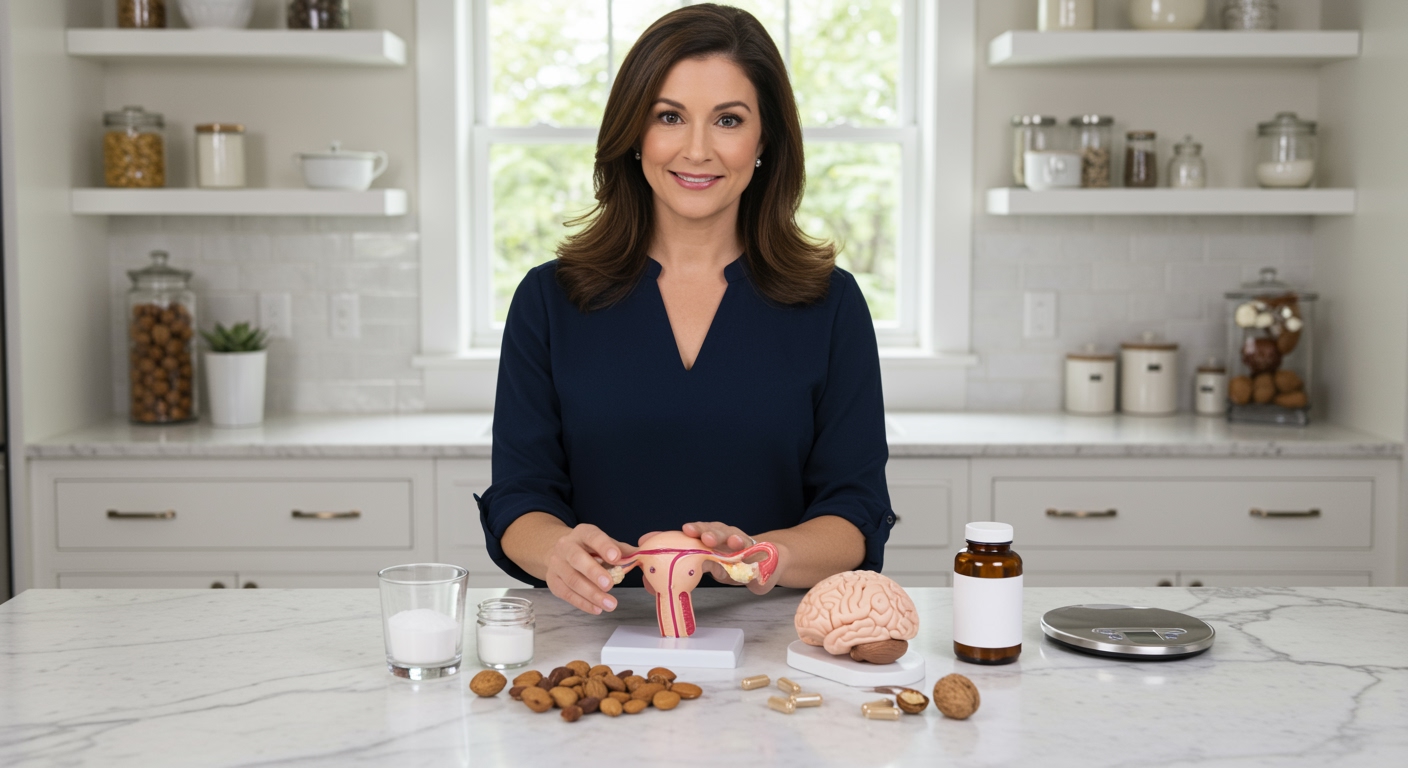✪ Key Takeaway: Phenylalanine may help PCOS by supporting dopamine production, but evidence remains limited and supplementation requires careful consideration.
Introduction
Women with PCOS often search for natural ways to manage their symptoms beyond traditional treatments.
You might have heard about phenylalanine as a potential helper for PCOS, especially if you struggle with mood swings, cravings, or weight management.
Hi, I’m Abdur, your nutrition coach and today I’m going to explain how phenylalanine works in your body and whether it can truly help with PCOS symptoms.
What Is Phenylalanine And How Does It Work?
Phenylalanine is an essential amino acid that your body cannot make on its own.
You must get it from food sources like meat, fish, eggs, dairy products, nuts, and seeds.
Once inside your body, phenylalanine converts to tyrosine, another amino acid that serves as a building block for important brain chemicals.
Tyrosine then transforms into dopamine, a neurotransmitter that controls mood, motivation, and reward pathways in your brain.
Dopamine also converts to norepinephrine and epinephrine, which are stress hormones that affect your metabolism and energy levels.
This conversion pathway explains why some people believe phenylalanine might help with PCOS symptoms like depression, low energy, and weight gain.
✪ Fact: Your brain uses about 20% of your daily energy, making neurotransmitter production a metabolically expensive process.
Does Phenylalanine Help With PCOS Mood Issues?
Many women with PCOS experience mood disorders including depression, anxiety, and emotional eating patterns.
Research shows that PCOS women have altered dopamine signaling in their brains, which might contribute to these psychological symptoms.
Since phenylalanine helps produce dopamine, some researchers theorize that supplementation could improve mood and reduce cravings.
However, the scientific evidence specifically linking phenylalanine supplements to improved PCOS mood symptoms remains very limited.
Most studies on phenylalanine and mood have been conducted on people with depression or other psychiatric conditions, not specifically PCOS patients.
Your body also has complex feedback mechanisms that regulate neurotransmitter production, so simply taking more phenylalanine does not guarantee higher dopamine levels.
✪ Pro Tip: Focus on proven PCOS mood management strategies like regular exercise, adequate sleep, and stress reduction before considering supplements.
Can Phenylalanine Support Weight Management In PCOS?
Weight management represents one of the biggest challenges for women with PCOS.
Some supplement companies claim that phenylalanine can boost metabolism and reduce appetite through its effects on dopamine and other brain chemicals.
The theory suggests that higher dopamine levels might reduce food cravings and improve motivation for physical activity.
Additionally, the conversion of phenylalanine to epinephrine could theoretically increase your metabolic rate and fat burning.
Unfortunately, no clinical trials have specifically tested phenylalanine supplementation for weight loss in PCOS women.
The few studies on phenylalanine and weight management in general populations show mixed results with very small effect sizes.
Your body weight depends on many factors including insulin resistance, inflammation, genetics, and lifestyle habits that phenylalanine alone cannot address.
✪ Note: Sustainable weight management in PCOS requires a comprehensive approach addressing insulin resistance, not single amino acid supplementation.
What Are The Risks And Side Effects?
Phenylalanine supplementation carries several important risks that you need to understand before considering it.
People with phenylketonuria (PKU), a genetic condition affecting about 1 in 10,000 people, cannot properly process phenylalanine and must avoid it completely.
High doses of phenylalanine can cause headaches, nausea, heartburn, and sleep disturbances in sensitive individuals.
The amino acid can also interact with certain medications including antidepressants, blood pressure medications, and diabetes drugs.
Since phenylalanine affects neurotransmitter production, it might worsen anxiety or panic disorders in some women.
Pregnant and breastfeeding women should avoid phenylalanine supplements because high levels can harm fetal brain development.
The long-term safety of phenylalanine supplementation in PCOS women has not been studied, making it a potentially risky experiment with your health.
✪ Pro Tip: Always consult your healthcare provider before starting any amino acid supplement, especially if you take medications or have other health conditions.
Should You Get Phenylalanine From Food Instead?
Getting phenylalanine from whole foods offers a safer and more balanced approach than taking concentrated supplements.
High-quality protein sources like lean meats, fish, eggs, and dairy products provide phenylalanine along with other essential amino acids your body needs.
Plant-based options include almonds, peanuts, sesame seeds, and soybeans which also offer fiber, healthy fats, and other beneficial compounds.
When you eat protein-rich foods, your body gets a complete amino acid profile that works synergistically rather than flooding your system with one isolated compound.
Food sources also provide the cofactors and vitamins needed for proper amino acid metabolism, including B vitamins and magnesium.
A balanced diet with adequate protein typically provides 2-4 grams of phenylalanine daily, which meets most people’s physiological needs without risk of overdose.
✪ Fact: One large egg contains about 350mg of phenylalanine, while 3 ounces of chicken breast provides approximately 1000mg.
The Bottom Line
While phenylalanine plays important roles in brain chemistry and metabolism, current evidence does not support its use as a specific treatment for PCOS symptoms.
Focus on proven PCOS management strategies rather than chasing unproven supplements that might do more harm than good.
I would love to hear about your experiences with PCOS management or any questions you have about amino acids and women’s health in the comments below.
References
At NutritionCrown, we use quality and credible sources to ensure our content is accurate and trustworthy. Below are the sources referenced in writing this article:
- Frontiers in Endocrinology: PCOS and Amino Acid Research
- Frontiers in Endocrinology: PCOS Metabolic Pathways
- PMC: Amino Acids and Women’s Health
- Healthline: Phenylalanine Benefits and Risks





